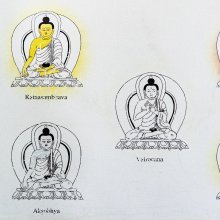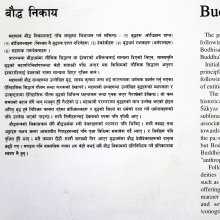Pravartana, Pravartanā: 12 definitions
Introduction:
Pravartana means something in Buddhism, Pali, Hinduism, Sanskrit, the history of ancient India, Marathi. If you want to know the exact meaning, history, etymology or English translation of this term then check out the descriptions on this page. Add your comment or reference to a book if you want to contribute to this summary article.
Images (photo gallery)
In Hinduism
Vyakarana (Sanskrit grammar)
Source: Shodhganga: Vaiyākaraṇabhūṣaṇasāra: a critical studyPravartanā (प्रवर्तना).—Prompting or inducement which is the denotation of liṅ affixes in general; an activity on the part of a person which leads to another person’s doing something as desired by the former.
Source: Wikisource: A dictionary of Sanskrit grammarPravartanā (प्रवर्तना).—Incitement or inducement which is the sense of 'lin' affixes in general ;cf. प्रवर्तनायां लिङ् (pravartanāyāṃ liṅ).

Vyakarana (व्याकरण, vyākaraṇa) refers to Sanskrit grammar and represents one of the six additional sciences (vedanga) to be studied along with the Vedas. Vyakarana concerns itself with the rules of Sanskrit grammar and linguistic analysis in order to establish the correct context of words and sentences.
Ayurveda (science of life)
Agriculture (Krishi) and Vrikshayurveda (study of Plant life)
Source: Shodhganga: Drumavichitrikarnam—Plant mutagenesis in ancient IndiaPravartana (प्रवर्तन) refers to “changing (the colours)” (of plants) which represents one of the bio-organic agricultural methods described in the Vṛkṣāyurveda by Sūrapāla (1000 CE): an encyclopedic work dealing with the study of trees and the principles of ancient Indian agriculture.—Accordingly, “Several special processes with reference to the plants will be described hereunder. They are: [e.g., changing the colours (varṇa-pravartana);] and so on. [...]”.

Āyurveda (आयुर्वेद, ayurveda) is a branch of Indian science dealing with medicine, herbalism, taxology, anatomy, surgery, alchemy and related topics. Traditional practice of Āyurveda in ancient India dates back to at least the first millenium BC. Literature is commonly written in Sanskrit using various poetic metres.
In Buddhism
Mahayana (major branch of Buddhism)
Source: academia.edu: A Study and Translation of the GaganagañjaparipṛcchāPravartana (प्रवर्तन) refers to “one who turns (the wheel of the dharma)”, according to the Gaganagañjaparipṛcchā: the eighth chapter of the Mahāsaṃnipāta (a collection of Mahāyāna Buddhist Sūtras).—Accordingly: “The Bodhisattva established on the pure path produces the great light of the dharma for the sake of living beings who are on the wrong path. Then those living beings, having attained the light, are also established in the true supramundane path. [...] (24) this path is in accordance with cultivating all qualities of the buddha since all good qualities are fully accomplished; (25) this path is in accordance with one who turns the wheel of the dharma (dharmacakra-pravartana-anugamana) since it keeps what has been taught before. [...]

Mahayana (महायान, mahāyāna) is a major branch of Buddhism focusing on the path of a Bodhisattva (spiritual aspirants/ enlightened beings). Extant literature is vast and primarely composed in the Sanskrit language. There are many sūtras of which some of the earliest are the various Prajñāpāramitā sūtras.
India history and geography
Source: Cologne Digital Sanskrit Dictionaries: Indian Epigraphical GlossaryPravartana.—(CII 1), establishment. Note: pravartana is defined in the “Indian epigraphical glossary” as it can be found on ancient inscriptions commonly written in Sanskrit, Prakrit or Dravidian languages.

The history of India traces the identification of countries, villages, towns and other regions of India, as well as mythology, zoology, royal dynasties, rulers, tribes, local festivities and traditions and regional languages. Ancient India enjoyed religious freedom and encourages the path of Dharma, a concept common to Buddhism, Hinduism, and Jainism.
Languages of India and abroad
Marathi-English dictionary
Source: DDSA: The Aryabhusan school dictionary, Marathi-Englishpravartana (प्रवर्तन).—n Setting up. Inciting. Action.
Marathi is an Indo-European language having over 70 million native speakers people in (predominantly) Maharashtra India. Marathi, like many other Indo-Aryan languages, evolved from early forms of Prakrit, which itself is a subset of Sanskrit, one of the most ancient languages of the world.
Sanskrit dictionary
Source: DDSA: The practical Sanskrit-English dictionaryPravartana (प्रवर्तन).—1 Going on, moving forward.
2) Beginning, commencement.
3) Setting on foot, founding, establishing, instituting.
4) Prompting, urging, simulating, inciting.
5) Engaging in, applying oneself to.
6) Happening, coming to pass.
7) Activity, action.
8) Behaviour, conduct, procedure.
9) Directing, superintending.
1) Employment.
11) Exhortation.
-nā Inciting or prompting to action; अस्ति प्रवर्तनारूपमनुरूपं चतुर्ष्वपि (asti pravartanārūpamanurūpaṃ caturṣvapi) Bh.
Derivable forms: pravartanam (प्रवर्तनम्).
Source: Cologne Digital Sanskrit Dictionaries: Benfey Sanskrit-English DictionaryPravartana (प्रवर्तन).—i. e. pra-vṛt + ana, n. 1. Going forward, [Rāmāyaṇa] 6, 92, 4. 2. Engaging in, [Mānavadharmaśāstra] 11, 63. 3. Beginning. 4. Activity. 5. Stimulating, [Daśakumāracarita] in
Pravartana (प्रवर्तन).—[neuter] moving forwards or onwards, coming forth from ([ablative]), arising, appearing, happening; acting, dealing with ([instrumental] or [locative]); causing, producing, fetching, applying, introducing.
Source: Cologne Digital Sanskrit Dictionaries: Monier-Williams Sanskrit-English Dictionary1) Pravartana (प्रवर्तन):—[=pra-vartana] [from pra-varta > pra-vṛt] mf(ī)n. being in motion, flowing, [Raghuvaṃśa x, 38] ([Calcutta edition] vartin)
2) Pravartanā (प्रवर्तना):—[=pra-vartanā] [from pra-vartana > pra-varta > pra-vṛt] f. incitement to activity, [Gautama-dharma-śāstra]
3) [v.s. ...] (in gram.) order, permission, the sense of the precative or qualified imperative tense (?), [Horace H. Wilson]
4) Pravartana (प्रवर्तन):—[=pra-vartana] [from pra-varta > pra-vṛt] n. advance, forward movement, rolling or flowing forth, [Rāmāyaṇa; Varāha-mihira; Yājñavalkya [Scholiast or Commentator]]
5) [v.s. ...] walking, roaming, wandering, [Rāmāyaṇa]
6) [v.s. ...] activity, procedure, engaging in, dealing with ([instrumental case] or [locative case]), [Mahābhārata; Kāvya literature] etc.
7) [v.s. ...] going on, coming off, happening, occurrence, [Mahābhārata; Harivaṃśa] etc.
8) [v.s. ...] conduct, behaviour, [Mahābhārata]
9) [v.s. ...] bringing near, fetching, [Śāṅkhāyana-śrauta-sūtra]
10) [v.s. ...] erection, construction, [Manu-smṛti; Yājñavalkya [Scholiast or Commentator]]
11) [v.s. ...] causing to appear, bringing about, advancing, promoting, introducing, employing, using, [Mahābhārata; Rāmāyaṇa] etc.
12) [v.s. ...] informing, [Horace H. Wilson]
[Sanskrit to German]
Sanskrit, also spelled संस्कृतम् (saṃskṛtam), is an ancient language of India commonly seen as the grandmother of the Indo-European language family (even English!). Closely allied with Prakrit and Pali, Sanskrit is more exhaustive in both grammar and terms and has the most extensive collection of literature in the world, greatly surpassing its sister-languages Greek and Latin.
See also (Relevant definitions)
Partial matches: Pra, Vartana.
Starts with: Pravartanashila, Pravartanashilate, Pravartanashile, Pravartanata.
Ends with: Abhipravartana, Anupravartana, Apravartana, Arthapravartana, Cakrapravartana, Citrapravartana, Dahavatpurishapravartana, Dharmacakrapravartana, Duhkhapurishapravartana, Gandhapravartana, Mahayantrapravartana, Margaipurishapravartana, Nicayapurishapravartana, Pancakalapravartana, Parvatipravartana, Sampravartana, Udavartapurishapravartana, Varnapravartana, Vinadyapurishapravartana, Vinamyapurishapravartana.
Full-text (+49): Apravartana, Dharmacakra, Triskandhaka, Nivartana, Pancakalapravartana, Parvatipravartana, Anupravartana, Mahayantra, Abhipravartana, Pravartanata, Vidhi, Mahayantrapravartana, Dharmacakrapravartana, Sampravartana, Vrishabhata, Varna, Gandha, Kapatha, Karmantika, Tila.
Relevant text
Search found 22 books and stories containing Pravartana, Pravartanā, Pra-vartana, Pra-vartanā; (plurals include: Pravartanas, Pravartanās, vartanas, vartanās). You can also click to the full overview containing English textual excerpts. Below are direct links for the most relevant articles:
Sahitya-kaumudi by Baladeva Vidyabhushana (by Gaurapada Dāsa)
Text 7.30 < [Chapter 7 - Literary Faults]
Mimamsa interpretation of Vedic Injunctions (Vidhi) (by Shreebas Debnath)
Chapter 2.7 - Kumārila Bhaṭṭa and Prabhākara Miśra on Vidhi
Vivekachudamani (by Shankara)
Bhakti-rasamrta-sindhu (by Śrīla Rūpa Gosvāmī)
Verse 3.3.90 < [Part 3 - Fraternal Devotion (sakhya-rasa)]
Bhajana-Rahasya (by Srila Bhaktivinoda Thakura Mahasaya)
Text 35 < [Chapter 2 - Dvitīya-yāma-sādhana (Prātaḥ-kālīya-bhajana)]
Text 43 < [Chapter 2 - Dvitīya-yāma-sādhana (Prātaḥ-kālīya-bhajana)]
Prasthanatrayi Swaminarayan Bhashyam (Study) (by Sadhu Gyanananddas)
1.3. Ātman-Body Relation < [Chapter 3 - Analysis on the Basis of Metaphysics]

